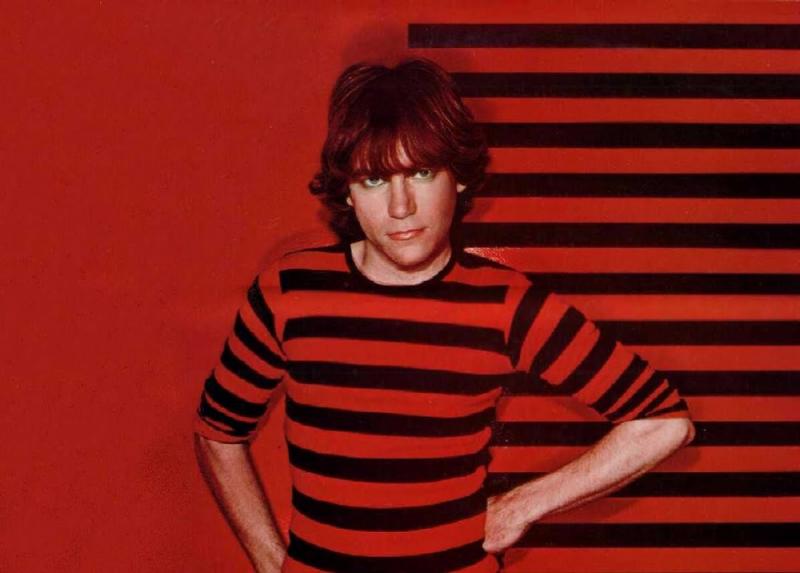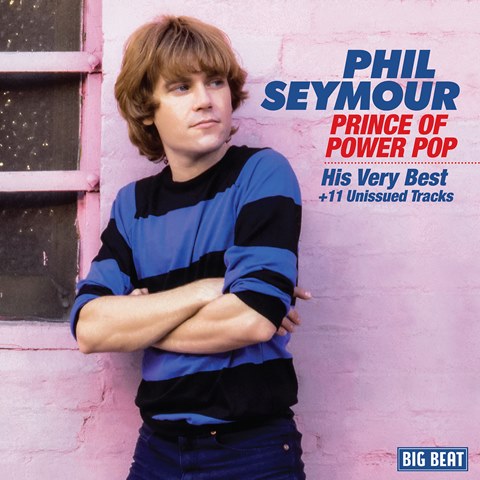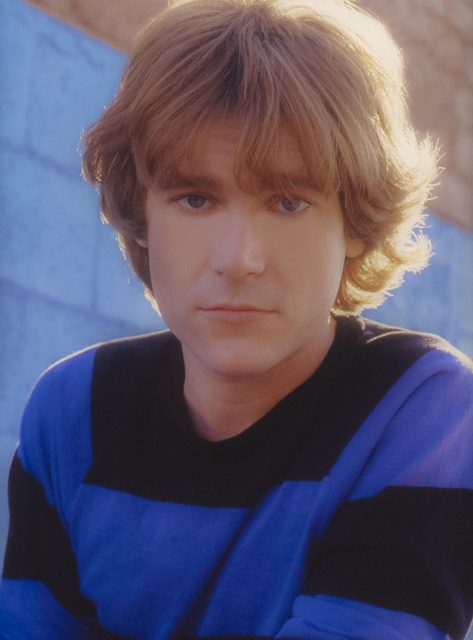Reissue CDs Weekly: Phil Seymour | reviews, news & interviews
Reissue CDs Weekly: Phil Seymour
Reissue CDs Weekly: Phil Seymour
Illuminating yet frustrating best-of dedicated to the ‘Prince of Power Pop’

“Precious to me” is a high-carat gold nugget. A guitar-pop song with cascading, lush Everly Brothers harmonies drawing on The Searchers’ version of “When You Walk in the Room”, its immediate tune instantly lodges itself in the head.
Instead of being from the Sixties, “Precious to me” was a US hit in Spring 1981, a period when punk had given way to the acceptable face of new wave. The commercial door for concise, classically styled songs was open. Phil Seymour, the song’s writer and singer, had a pre-punk résumé, knew all about pop and rode the moment. His music fit the power pop profile: the rocky take on driving Sixties pop evoking an era before rock music became so complex it forgot how to deliver instant thrills. New wave and power pop went hand in hand.
 With its arresting title, the fascinating new compilation Prince of Power Pop – His Very Best celebrates Seymour’s early solo years with 24 tracks plucked from 1980 to 1983. Of the 24 cuts, just nine were issued at the time on two solo albums and a single: figures implying his best recordings were shelved. The final nine tracks are from a 1980 demo session which has never been previously issued.
With its arresting title, the fascinating new compilation Prince of Power Pop – His Very Best celebrates Seymour’s early solo years with 24 tracks plucked from 1980 to 1983. Of the 24 cuts, just nine were issued at the time on two solo albums and a single: figures implying his best recordings were shelved. The final nine tracks are from a 1980 demo session which has never been previously issued.
Like acid folk or hypnagogic pop, power pop is a genre retrospectively applied to the already existing. Amongst others, it encompasses The Who at their 1965/6 flash-bang edgiest, The Nazz, Big Star, The Raspberries, The Plimsouls, Britain’s The Records and, most relevant to Seymour, Dwight Twilley.*
In 1967, Seymour met Dwight Twilley at a Tulsa, Oklahoma cinema which was showing The Beatles’ A Hard Day’s Night. In 1975, as The Dwight Twilley Band with Seymour on bass, drums and vocals, they charted in America with the punchy “I’m on Fire”. Seymour also worked with Tom Petty – singing on “American Girl” and “Breakdown” – went solo in 1978 and, with his debut single “Precious to me”, charted again. Born in 1952, he died of lymphoma in 1993.
Clearly, Seymour has fans. The title evidences this. So do the effusive liner notes. The opening paragraph says for “admirers of 60s-style rock in the 80s [he is] a shining light on high.” Of the demos rounding out the compilation, the text declares the band as “quivering with excitement and delivering the performance of their lives” and that this is “truly exceptional music.”
 For those coming to Prince of Power Pop who are neither already committed fans or lacking an in-depth knowledge of Seymour’s music, this eye-catching comp doesn’t quite make the case. “Precious to me” is indisputably fantastic. So are the stomping, “Hippy Hippy Shake”-ish “Then we go up”, “How About You” with its nods to rockabilly (Dave Edmunds was a musical cousin of Seymour’s) and the similarly inclined “Teaching me”.
For those coming to Prince of Power Pop who are neither already committed fans or lacking an in-depth knowledge of Seymour’s music, this eye-catching comp doesn’t quite make the case. “Precious to me” is indisputably fantastic. So are the stomping, “Hippy Hippy Shake”-ish “Then we go up”, “How About You” with its nods to rockabilly (Dave Edmunds was a musical cousin of Seymour’s) and the similarly inclined “Teaching me”.
While possible to get past the intrusive sheen of the typically early-Eighties mainstream Californian production, what becomes clear as the collection plays out is that the compiler’s idea of a best-of – even with the slightly odd, get-out clause title His Very Best + 11 Unissued Tracks – does not necessarily chime with their assessment of Seymour’s singularity. The previously unheard “Fade Away” is a horrible stab at reggae and “Maybe it was Memphis” (first issued in 2011) is an AOR power ballad suggesting Toto at their most egregious. On the 1980 demo session, the lumpy runs through the Motown classics “You Can’t Hurry Love” and “Love is Like an Itching in my Heart” might have been OK if heard in a bar when played by a commonplace covers band but, at this remove, do nothing to enhance perceptions of Seymour’s reputation.
Due to its inconsistency, Prince of Power Pop - His Very Best requires careful navigation. However, once the inessential is tuned out it does make the case that Phil Seymour was onto something special. A best-of of this best-of is needed and, at his best, he was a prince of power pop.
* In early 1978, Greg Shaw characterised powerpop (one word) in his definitive article for issue 12 of Bomp magazine.
- Next week: box set dedicated to The Jam’s 1977, the first year their records hit the shops
- Read more reissue reviews on theartsdesk
Explore topics
Share this article
The future of Arts Journalism
You can stop theartsdesk.com closing!
We urgently need financing to survive. Our fundraising drive has thus far raised £49,000 but we need to reach £100,000 or we will be forced to close. Please contribute here: https://gofund.me/c3f6033d
And if you can forward this information to anyone who might assist, we’d be grateful.

Subscribe to theartsdesk.com
Thank you for continuing to read our work on theartsdesk.com. For unlimited access to every article in its entirety, including our archive of more than 15,000 pieces, we're asking for £5 per month or £40 per year. We feel it's a very good deal, and hope you do too.
To take a subscription now simply click here.
And if you're looking for that extra gift for a friend or family member, why not treat them to a theartsdesk.com gift subscription?
more New music
 Solar Eyes, Hare & Hounds, Birmingham review - local lads lay down some new tunes for a home crowd
Psychedelic indie dance music marinated in swirling dry ice
Solar Eyes, Hare & Hounds, Birmingham review - local lads lay down some new tunes for a home crowd
Psychedelic indie dance music marinated in swirling dry ice
 The Lemonheads' 'Love Chant' is a fine return to form
Evan Dando finally gets back in the saddle with an album of new tunes
The Lemonheads' 'Love Chant' is a fine return to form
Evan Dando finally gets back in the saddle with an album of new tunes
 Music Reissues Weekly: Evie Sands - I Can’t Let Go
Diligent, treasure-packed tribute to one of Sixties’ America’s great vocal stylists
Music Reissues Weekly: Evie Sands - I Can’t Let Go
Diligent, treasure-packed tribute to one of Sixties’ America’s great vocal stylists
 'Deadbeat': Tame Impala's downbeat rave-inspired latest
Fifth album from Australian project grooves but falls flat
'Deadbeat': Tame Impala's downbeat rave-inspired latest
Fifth album from Australian project grooves but falls flat
 Heartbreak and soaring beauty on Chrissie Hynde & Pals' Duets Special
The great Pretender at her most romantic and on the form of her life
Heartbreak and soaring beauty on Chrissie Hynde & Pals' Duets Special
The great Pretender at her most romantic and on the form of her life
 The Last Dinner Party's 'From the Pyre' is as enjoyable as it is over-the-top
Musically sophisticated five-piece ramp up the excesses but remain contagiously pop
The Last Dinner Party's 'From the Pyre' is as enjoyable as it is over-the-top
Musically sophisticated five-piece ramp up the excesses but remain contagiously pop
 Moroccan Gnawa comes to Manhattan with 'Saha Gnawa'
Trance and tradition meet Afrofuturism in Manhattan
Moroccan Gnawa comes to Manhattan with 'Saha Gnawa'
Trance and tradition meet Afrofuturism in Manhattan
 Soulwax’s 'All Systems Are Lying' lays down some tasty yet gritty electro-pop
Belgian dancefloor veterans return to the fray with a dark, pop-orientated sound
Soulwax’s 'All Systems Are Lying' lays down some tasty yet gritty electro-pop
Belgian dancefloor veterans return to the fray with a dark, pop-orientated sound
 Music Reissues Weekly: Marc and the Mambas - Three Black Nights Of Little Black Bites
When Marc Almond took time out from Soft Cell
Music Reissues Weekly: Marc and the Mambas - Three Black Nights Of Little Black Bites
When Marc Almond took time out from Soft Cell
 Album: Mobb Deep - Infinite
A solid tribute to a legendary history
Album: Mobb Deep - Infinite
A solid tribute to a legendary history
 Album: Boz Scaggs - Detour
Smooth and soulful standards from an old pro
Album: Boz Scaggs - Detour
Smooth and soulful standards from an old pro
 Emily A. Sprague realises a Japanese dream on 'Cloud Time'
A set of live improvisations that drift in and out of real beauty
Emily A. Sprague realises a Japanese dream on 'Cloud Time'
A set of live improvisations that drift in and out of real beauty

Add comment